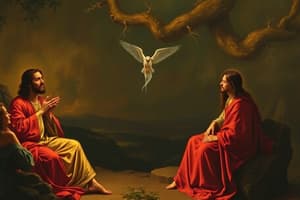Podcast
Questions and Answers
What aspect of the Sermon on the Mount does Nietzsche primarily criticize?
What aspect of the Sermon on the Mount does Nietzsche primarily criticize?
- Its emphasis on strict ethical laws
- Its encouragement of communal living
- Its endorsement of 'slave morality' (correct)
- Its promotion of a humble spirit
According to the contrasting perspective offered by Pope Benedict XVI, what does the Sermon on the Mount promote?
According to the contrasting perspective offered by Pope Benedict XVI, what does the Sermon on the Mount promote?
- A pathway to reach one's full potential through love and self-transcendence (correct)
- A call for complete withdrawal from society
- A legalistic set of moral rules
- A philosophy of power and dominance
Which metaphor is used in the Sermon on the Mount to illustrate the importance of adhering to its teachings?
Which metaphor is used in the Sermon on the Mount to illustrate the importance of adhering to its teachings?
- A wise man building his house upon the rock (correct)
- A shepherd tending to sheep
- A gardener nurturing plants to bloom
- A lighthouse guiding ships safely
What outcome does Nietzsche associate with the Sermon on the Mount's teachings?
What outcome does Nietzsche associate with the Sermon on the Mount's teachings?
How does Nietzsche's criticism of the Sermon differ fundamentally from Pope Benedict XVI's interpretation?
How does Nietzsche's criticism of the Sermon differ fundamentally from Pope Benedict XVI's interpretation?
Flashcards
Sermon on the Mount
Sermon on the Mount
A collection of teachings by Jesus emphasizing moral principles.
Nietzsche's Critique
Nietzsche's Critique
Nietzsche criticized the Sermon as promoting 'slave morality' that hinders individual strength.
Slave Morality
Slave Morality
A concept where moral systems favor the weak over the strong, according to Nietzsche.
Christian Morality
Christian Morality
Signup and view all the flashcards
Enduring Relevance
Enduring Relevance
Signup and view all the flashcards
Study Notes
The Sermon on the Mount
- Wise man builds house on rock; foolish man on sand. Floods and winds destroy the house built on sand; the house built on rock survives.
- Followers astonished by Jesus' authority, unlike scribes.
Realism of the Sermon
- Countless admirers, but also critics, especially Nietzsche.
- Nietzsche criticized Jesus' teachings, calling it "slave morality."
- Nietzsche viewed this as detrimental to "mankind" and claimed it created "wimps."
- Nietzsche disliked the New Testament.
- Pope Benedict's response: True morality is love, counter to self-seeking. This leads to self-discovery and richness of life.
- Sermon on the Mount describes a path to love, self-knowledge, and richness of human life.
- How to attain perfection like the divine Father is discussed.
Studying That Suits You
Use AI to generate personalized quizzes and flashcards to suit your learning preferences.




